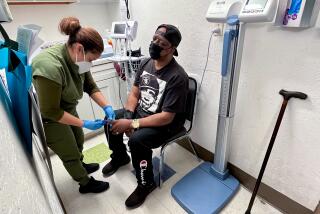‘Fly-by-Night’ Cholesterol Testing Poses Health Risks, Officials Warn
- Share via
WASHINGTON — Consumers were warned Monday that some cholesterol screenings in public places, such as shopping malls and mobile operations, are inaccurate and could be hazardous.
Citing unsanitary conditions, unqualified testers and inaccurately calibrated equipment, Department of Health and Human Services Inspector General Richard P. Kusserow warned that many “fly-by-night (screening) outfits are crossing the line from shoddy to criminal. It’s like a modern medical carnival.
“Given today’s concern for the spread of AIDS and hepatitis, these findings are particularly disturbing,” he told the House subcommittee on regulation, business opportunities and energy.
Currently, 16 states regulate public cholesterol screening, but California is not among them.
Rep. Ron Wyden (D-Ore.), chairman of the subcommittee, advocated more regulation of the testing, saying that unregulated screening is like “playing Russian roulette with safety.”
Inaccurate readings could cause people to “be lulled into a false sense of security. They may not see a doctor, they may not change their diets and they may not exercise,” he said.
High blood-cholesterol levels are linked to coronary heart diseases, the No. 1 cause of death in the U.S.
Jerry Wilson, director of the Citizens for the Treatment of High Blood Pressure and Public Action on Cholesterol, said 20% to 25% of all persons tested for high cholesterol at public places are falsely reassured that they have normal blood-cholesterol levels when their blood-cholesterol level actually is in the danger area.
“Nearly six of every 10 adults have a cholesterol level in excess of the recommended levels,” he said. “Based on that, 64 million people are at definite high risk for cardiovascular disease.”
At least 25% of the 4 to 6 billion annual lab tests for cholesterol are done in untraditional settings, such as shopping centers, food and drug stores and government buildings, according to Dr. J. Mehsen Joseph, an administrator in the Maryland Department of Health and Mental Hygiene.
Joseph warned that hepatitis B and the AIDS virus were examples of blood-borne diseases that could be easily transmitted at public screening locations if precautions are not taken.
In testimony and a report they prepared, Kusserow and other Health and Human Services officials said they had seen blood-covered tables, blood-gathering materials thrown away in public garbage cans and testers who did not wear gloves or disinfect after collections. In many cases, the investigators who visited sites found that workers pricked the fingers of the people being tested, then squeezed the blood out--a process which can dilute the sample with material from between the cells and give a lower than true result.
Cholesterol testing among American adults has nearly doubled to 66% since 1983.
“This is a very, very lucrative small business that requires little more in start-up costs than the few thousand dollars it takes to buy a digital testing machine,” said Wyden. “The purchaser need not demonstrate any medical training or health expertise.”
Dr. Robert Rej, an administrator in the New York State Department of Health, questioned whether any tester could do an adequate job at public sites.
“Some 42% of all screenings are staffed by one person,” he said. “How can any one person handle monetary transactions, answer questions, sell materials and conduct the actual testing accurately?”
Wyden said the federal government should set minimum standards.
“The consensus here is that we need to make these tests as accessible as we can, but with strong regulations,” said Wyden. “Our concern is that there is no safety net.”
BACKGROUND
Cholesterol is a crystalline fatty substance found in especially high levels in animal fats. Heredity and diet both play a role in the blood-cholesterol level. A diet high in animal fats, such as meat, eggs and dairy products, contributes to an elevated cholesterol level. The American Heart Assn. last week issued a strongly worded report saying the link between cholesterol and heart disease is “overwhelming and indisputable.”
More to Read
Sign up for Essential California
The most important California stories and recommendations in your inbox every morning.
You may occasionally receive promotional content from the Los Angeles Times.













